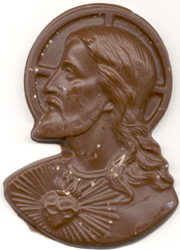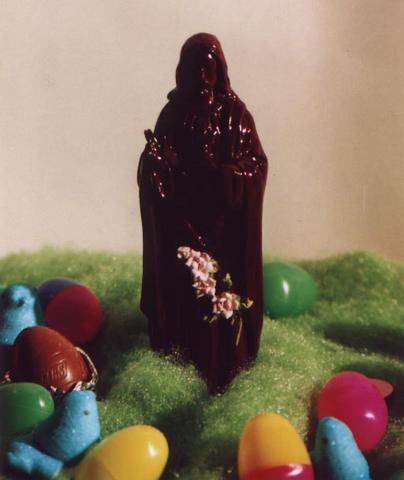
from www.jfreak.com (click image to see the products)


My favorite novel is The Chocolate War by Robert Cormier. Written in
1974, it’s about a teen who refuses to participate in his Catholic
high school’s annual chocolate sale—with devastating consequences.
One day while looking up “chocolate” on a library computer, I ran
across a novel title, Chocolate Jesus (1998) by Stephen Jaramillo,
about a candymaker who fashions an edible Savior treat for Easter,
and the vegetarian minister who opposes him. Sounds similar, I
thought, to the plot of Chocolat, the novel (Joanne Harris, 1999) and
movie about a French chocolatier who opens her candy store during
Lent—a sort of Chocolate War in reverse. Unlike Jerry Renault, who
won’t sell the chocolates, Vianne must sell the chocolates!
On the Internet I found a different “Chocolate Jesus” (Shane Ryan
Staley, 2000), a scatological short story about an abused little boy,
skipping church, whose chocolate bar melts into a talking mini-Jesus!
Even Like Water for Chocolate, the Mexican novel (Laura Esquivel,
1992) and movie, blends foodmaking with the supernatural.
I also bought through the web an out-of-print kiddie book,
How God Gives Us Chocolate (Henrietta Gambill, 1982).
What’s this about God and Chocolate?
You won’t find chocolate in the Bible; the cacao bean, native to the
New World, was unknown to ancient Israel. But if Jesus had come to
Mexico instead of Israel, might he have enjoyed a chocolate drink
with the Aztec royalty? Didn’t they consider chocolate “the food of
the gods”?
We think of chocolate—really good chocolate—as one of
those “sinfully” delicious treats, less controversial than alcohol,
or even tea or coffee. (Chocolate does contain a little caffeine.)
I wonder if chocolate in these stories symbolizes joy, delight,
pleasure, or indulgence. Does chocolate stand for temptation and
sin, or for freedom to enjoy God’s bounty?
Of course there are sweets in the Bible—honey, dates, raisin cakes,
apples, nuts. Strengthen me with raisins, refresh me with apples,
says the Song of Songs. Eat honey, but not too much, advises
Proverbs. The Promised Land is described as a land flowing with milk
and honey. Today, chocolate manufacturers add milk and sugar to
cocoa powder and cocoa butter, creating the famous candy bars we
enjoy.
I think Jesus would’ve enjoyed a chocolate drink as much as he
enjoyed turning water into wine at a wedding feast. He said of
himself, “The Son of Man came eating and drinking, and they
say, ‘Here is a glutton and a drunkard, a friend of tax collectors
and “sinners.”’”
Now you can glut on chocolate and get too fat, just as you can
overindulge in alcohol and get drunk, so I recommend moderation
here. Whatever you eat, eat unto the Lord.
Jesus liked good food, and he even used food to symbolize himself,
calling the Passover flatbread and wine his Body and Blood. He chose
this food to memorialize his death on the cross, where he paid the
price for your sins and mine. After he rose again, he broke bread
before his disciples, and also cooked them fish for breakfast.
Whether the idea of a chocolate Jesus appeals to you or appalls you,
remember please to feed upon the real Jesus. Take him into your
heart, not just your stomach. Feed on him and his Word, and drink of
his Spirit. Right now he’s in heaven preparing a marriage supper
feast for you—if you accept his invitation. In fact, God commands
all people everywhere to rethink their ways, and be saved.
Taste and see that the Lord is good!
--M. N. Lee, Queens, NY
mnl_1221@yahoo.com
Bible references: Song of Songs 2:5; Proverbs 24:13 and 25:16; Exodus
3:8, for example; John 2:1-11; Matthew 11:19 and Luke 7:34;
1 Corinthians 10:31 and Colossians 3:17; Matthew 26:17-30 and
Luke 22:7-20; Luke 24:30; John 21:9, 12-13; John 6, especially
verse 35; John 14:2-4, Luke 22:29-30, and Revelation 19:7-9; Acts 17:30; Psalm 34:8!
Book references: The Emperors of Chocolate: Inside the Secret World
of Hershey and Mars, by Joel Glenn Brenner (1998)
The Lord's Table: The Meaning of Food in Early Judaism and
Christianity, by Gillian Feeley-Harnik (1994)
Chocolate Jesus photo © 2001 Texas Travesty
Don’t Fear the Terror! Scriptures for Halloween
